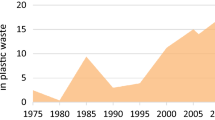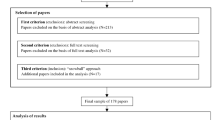Abstract
In May 2003, the South African government enacted regulations banning the production of thin-film plastic shopping bags. The government advocated that such thin-film plastic shopping bags were indiscriminately discarded because they had no economic and recycling value. However, in as much as the regulations led to significant reductions in plastic shopping bags in the environment, the law resulted in severe unintended negative consequences, as jobs were lost with some businesses in the plastic shopping bag manufacturing sector closing down. The paper also reveals that key stakeholders, such as industry, business and labour, lobbied against the introduction of the regulations but without success. On average, business went down by about 83% with a conservative 25% reduction in employment. Drawing insights from the Irish and Australian experiences, this paper critically reviews sustainability debates and responses surrounding environmental regulation and business, with a special focus on the Plastic Bag Regulations in South Africa. Lessons learnt are presented with the intention to provide insights for future waste product or other environmental regulation initiatives in South Africa and elsewhere in the region.

Similar content being viewed by others
References
Arksey, H., & Knight, P. (1999). Interviewing for social scientists: An introduction with examples. London: Sage.
Australian Retailers Association (2003). Submission to the Senate inquiry into the Plastic Bag (Minimisation of Usage) Education Fund Bill 2002 and Plastic Bag Levy (Assessment and Collection) Bill 2002. Brisbane: Australian Retailers Association.
Botha, E. (2000). Industry wants more debate on plastic bag problem. Daily Dispatch, September 14.
Creswell, J. W. (2003). Research design: Qualitative, quantitative and mixed methods approaches. Thousand Oaks: Sage.
Department of Environmental Affairs and Tourism (2002). Plastic Bags Agreement. Pretoria: Department of Environmental Affairs and Tourism.
Department of Environment and Local Government (1998). Consultancy study on plastic bags. Dublin: Department of Environment, Heritage and Local Government.
Department of Environment and Local Government (2001). Waste Management (Amendment) Act 2001. Dublin: Department of Environment, Heritage and Local Government.
Department of Environment and Local Government (2003). Waste Management (Packaging) Regulations, 2003. Dublin: Department of Environment, Heritage and Local Government.
Department of Environment and Local Government (2004). Waste Management: Taking stock and moving forward. Dublin: Department of Environment, Heritage and Local Government.
E-mail 2. (2003). Cosatu position on plastic bag regulations. National Economic Development Labour Council, Pretoria, August 8, 2003.
E-mail 13. (2004). Request for information concerning plastic bags production. Nampak Polyfoil, Cape Town, February 16, 2004.
E-mail 16. (2004). Request for information concerning plastic bags production. Nampak Polifoil, Johannesburg, February 16, 2004.
Environment Protection and Heritage Council (2002). Plastic Shopping Bags in Australia. Canberra: Environment Protection and Heritage Council.
Fishbein, B. K. (1994). Germany, garbage and the green dot: Challenging the throwaway society. New York: Inform.
Gjerde, K. M., & Kelleher, G. (2004). High seas: conservation beyond the fringe. The IUCN Bulletin: Rediscovering Planet Ocean, 1, 4–5.
Hugo, M. L. (2004). Environmental management: An ecological guide to sustainable living in Southern Africa. Ecoplan: Brooklyn Square.
Interview FF 9. (2003). Responses during Plastic Bags Regulations Implementation. Spar, Grahamstown, May 19, 2003.
Interview FF10. (2003). Responses during plastic bags regulations implementation. Checkers, Grahamstown, May 20, 2003.
Interview T 11. (2004). Impacts of plastic bags regulations implementation. Nampak Polyfoil, Johannesburg, February 16, 2004.
Interview T 14. (2004). Impacts of plastic bags regulations implementation. Plastics Federation of South Africa, Johannesburg, February 16, 2004.
Interview T 15. (2004). Impacts of plastic bags regulations implementation. Packaging Council of South Africa, Johannesburg, February 17, 2004.
Interview T 16. (2004). Impacts of plastic bags regulations implementation. ITB Manufacturing, Durban, February 17, 2004.
Interview T 25. (2004). Impacts of plastic bags regulations implementation. Transpaco, Johannesburg, February 17, 2004.
Interview T 31. (2004). Status of Buyisa-e-Bag Company. Plastics Federation of South Africa, Johannesburg, September 8, 2004.
Levy, G. M. (2000). Packaging, policy and the environment. Paris: Aspen.
Maxwell, J. A. (1996). Qualitative research design: An interpretive approach. London: Sage.
National Economic Development Labour Council (2001). Socio-economic impact of the proposed plastic bag regulations. Johannesburg: National Economic Development Labour Council.
National Environment Protection Council (1999). National environment protection (used packaging materials) measure. Brisbane: National Environment Protection Council.
Parliamentary Monitoring Group (2000). Public hearing on plastic bag regulations. Johannesburg: Parliamentary Monitoring Group.
Packaging Council of South Africa (2002). Dismay at revised regulations, Packaging Review, May 2002, 28, 33.
Plastics Federation of South Africa (2001). Plastics recycling: A survey of the South Africa recycling Industry 2000. Johannesburg: Plastics Federation of South Africa.
Plastics Federation of South Africa, Plastics Recycling Employers Organisation, and Chemical and Allied Industries Association (2002). Towards eliminating plastic bags from the environment: A plastics industry initiative. Johannesburg: Plastics Federation of South Africa, Plastics Recycling Employers Organisation, and Chemical and Allied Industries Association.
Republic of South Africa (2000). Proposed regulations under Section 24 of the Environmental Conservation Act, 1989 (Act N0. 73 of 1989). Cape Town: Government Printer.
Republic of South Africa (2002). Plastics bags regulations. Cape Town: Government Printer.
Republic of South Africa (2003). Regulations for the plastic carrier bags and plastic flat bags. Cape Town: Government Printer.
Short, M. K. J. (2003). Submission to the Senate Inquiry into the Plastic Bag (Minimisation of Usage) Education Fund Bill 2002 and Plastic Bag Levy (Assessment and Collection) Bill 2002. Queensland: Queensland Parks and Wildlife Service.
Silverman, D. (2001). Interpreting qualitative data: Methods for analysing talk, text and interaction. Sage: London.
Stevens, E. S. (2002). Green plastics: An introduction to the new science of biodegradable plastics. Princeton University Press: Princeton.
Zero Waste New Zealand Trust (2003). Zero Waste New Zealand: Plastic Shopping Bag Report. Auckland: Zero Waste New Zealand Trust.
Acknowledgements
Authors thank Nampak and Codesria for financial support.
Author information
Authors and Affiliations
Corresponding author
Rights and permissions
About this article
Cite this article
Nhamo, G. Regulating Plastics Waste, Stakeholder Engagement and Sustainability Challenges in South Africa. Urban Forum 19, 83–101 (2008). https://doi.org/10.1007/s12132-008-9022-0
Published:
Issue Date:
DOI: https://doi.org/10.1007/s12132-008-9022-0




